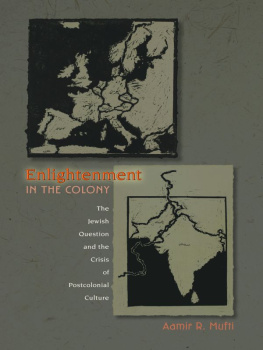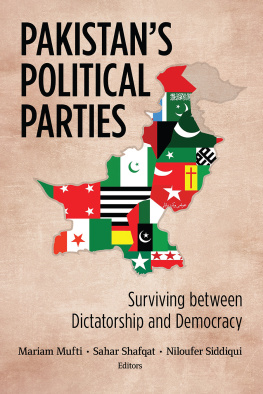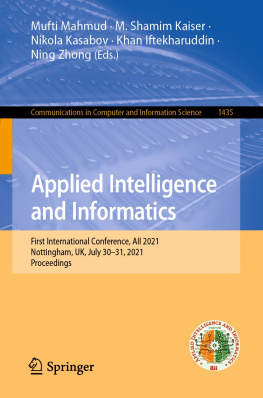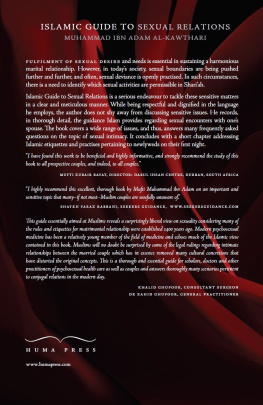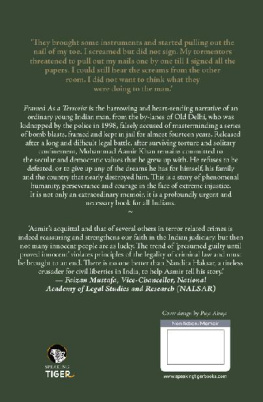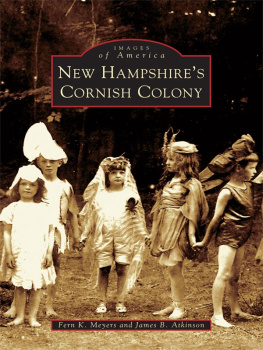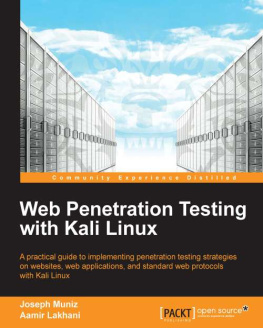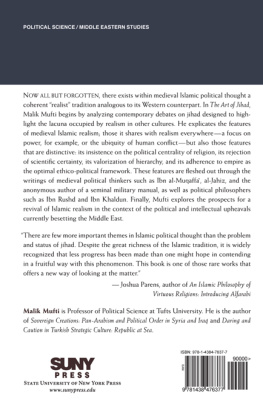Mufti Aamir R. - Enlightenment in the Colony
Here you can read online Mufti Aamir R. - Enlightenment in the Colony full text of the book (entire story) in english for free. Download pdf and epub, get meaning, cover and reviews about this ebook. publisher: Princeton University Press, genre: Politics. Description of the work, (preface) as well as reviews are available. Best literature library LitArk.com created for fans of good reading and offers a wide selection of genres:
Romance novel
Science fiction
Adventure
Detective
Science
History
Home and family
Prose
Art
Politics
Computer
Non-fiction
Religion
Business
Children
Humor
Choose a favorite category and find really read worthwhile books. Enjoy immersion in the world of imagination, feel the emotions of the characters or learn something new for yourself, make an fascinating discovery.
- Book:Enlightenment in the Colony
- Author:
- Publisher:Princeton University Press
- Genre:
- Rating:5 / 5
- Favourites:Add to favourites
- Your mark:
- 100
- 1
- 2
- 3
- 4
- 5
Enlightenment in the Colony: summary, description and annotation
We offer to read an annotation, description, summary or preface (depends on what the author of the book "Enlightenment in the Colony" wrote himself). If you haven't found the necessary information about the book — write in the comments, we will try to find it.
Enlightenment in the Colony — read online for free the complete book (whole text) full work
Below is the text of the book, divided by pages. System saving the place of the last page read, allows you to conveniently read the book "Enlightenment in the Colony" online for free, without having to search again every time where you left off. Put a bookmark, and you can go to the page where you finished reading at any time.
Font size:
Interval:
Bookmark:
Enlightenment in the Colony
Enlightenment in the Colony
THE JEWISH QUESTION AND THE CRISIS OF POSTCOLONIAL CULTURE
Aamir R. Mufti
PRINCETON UNIVERSITY PRESS
PRINCETON AND OXFORD
Copyright 2007 by Princeton University Press
Published by Princeton University Press, 41 William Street, Princeton, New Jersey 08540
In the United Kingdom: Princeton University Press, 3 Market Place, Woodstock,
Oxfordshire OX20 1SY
All Rights Reserved
Library of Congress Cataloging-in-Publication Data
Mufti, Aamir.
Enlightenment in the colony : the Jewish question and the crisis of postcolonial
culture / Aamir R. Mufti.
p.cm.
Includes bibliographical references and index.
eISBN: 978-1-40082-766-4
1.SecularismIndiaHistory.2.NationalismIndiaHistory.3.IndiaColonial influence. 4. Muslims in literature. 5. Jewsinliterature.6.JewsEuropeIdentityHistory.7.LiberalismEuropeHistory. I. Title.
DS428.2.M822007
211'.60954dc222006050393
British Library Cataloging-in-Publication Data is available
This book has been composed in Times Ten LT Std
Printed on acid-free paper.
pup.princeton.edu
Printed in the United States of America
10987654321



In memory of my parents,
Fakhrunnisa Mufti and Mufti Rashiduddin Ahmad,
in belated recognition of the journey they made
Contents
A Note on Translation and Transliteration
FOR ALL TEXTS ORIGINALLY in a language other than English, I provide standard English translations where these are available but alter these translations as I see fit. Citations for the original are also provided wherever necessary, but extracts of the text are reproduced in the original only where I engage closely with a text and feel it necessary for the purpose of the analysis. Translations from the Urdu-Hindi, and the occasional one from the French, unless otherwise indicated, are my own. For translations from the German, I am deeply grateful for the help of Willi Goetschel, who has been my ready reference source over long distances and for many years.
In matters of transliteration from the Urdu-Hindi, I follow the revised scheme proposed by the Annual of Urdu Studies(2005), with a few small changes of my own:chinstead of  kh instead of kh,and
kh instead of kh,and  instead of
instead of  , with the last two changes meant to facilitate reading by exclusively Devanagari readers. For all personal, place and organizational names I use the standard English versions, without diacritics. The only exception to this is made in the names of publishers in the notes and bibliography. In the case of some of these, either not well known in English or based on an Arabic or Persian morphological form or both (especially the
, with the last two changes meant to facilitate reading by exclusively Devanagari readers. For all personal, place and organizational names I use the standard English versions, without diacritics. The only exception to this is made in the names of publishers in the notes and bibliography. In the case of some of these, either not well known in English or based on an Arabic or Persian morphological form or both (especially the 
 , I give the transliteration with full diacritics in parentheses only at the_ first appearance of the name. Words of English origin used in Urdu-Hindifor instance, in organization namesare reproduced with their English spellings: hence Bureau, rather than
, I give the transliteration with full diacritics in parentheses only at the_ first appearance of the name. Words of English origin used in Urdu-Hindifor instance, in organization namesare reproduced with their English spellings: hence Bureau, rather than  . Also, words and phrases transliterated here from the Urdu-Hindi that have a strong and continued basis in Arabicas Islamic terms, for instanceare rendered as if from the written Arabic: hence
. Also, words and phrases transliterated here from the Urdu-Hindi that have a strong and continued basis in Arabicas Islamic terms, for instanceare rendered as if from the written Arabic: hence  , instead of va
, instead of va ul-vuj
ul-vuj d. Otherwise, Arabic-origin words are rendered as they are inscribed in Urdu script but with attention to how they are meant to be pronounced in Urdu-Hindi: hence not All Indic words are transcribed as written in the Urdu script, not Devanagari. In giving the Urdu names of organizations, English rules of capitalization are followed, but not in the case of titles of works in Urdu.
d. Otherwise, Arabic-origin words are rendered as they are inscribed in Urdu script but with attention to how they are meant to be pronounced in Urdu-Hindi: hence not All Indic words are transcribed as written in the Urdu script, not Devanagari. In giving the Urdu names of organizations, English rules of capitalization are followed, but not in the case of titles of works in Urdu.
Acknowledgments
THE LARGEST INTELLECTUAL DEBT accrued during this projects period of gestation is to the late Edward Said, my teacher, mentor, and friend. It is a cause of abiding sadness for me that his life was cut short before the appearance of this book, in whose composition his intellectual influence and support had played such an enormous role. I first met Edward in 1984 but did not formally become his student until late in 1989. All of us who started working with him in the 1980s were attracted to him in large measure by the role he played in making the question of the imperialization of the world indispensible to the study of modern culture.I realized only gradually that my own reasons had been somewhat different and had to do with the relationship in his work between the colonial question and the particular themes he spoke of as secular criticism and exile. It is this nexus of issues that constitutes the core of this work.
I also want to acknowledge here the intellectual influence of a long list of other teachers, many of whom will be unaware of this influence: John Briggs, Henry Rutz, Hy Van Luong, Maurice Bloch, Alfred Gell, Jonathan Parry, Robert Murphy, Allan Silver, Gauri Viswanathan, Jean Franco, Gayatri Spivak, David Lelyveld, and, in particular, Andreas Huyssen and Jean Howard. Professor C. M. Naim did me the honor of treating me as if I were his student when, without knowing it, I needed it most. It was an incalculable gift for which I am deeply grateful. His influence is everywhere visible in my engagements with the history of modern Urdu literature in part 2 of this book, even where I diverge significantly from his views, and final responsibility for all errors of fact or judgment must, of course, remain my own. Willi Goetschel was my first guide through Jewish cultural studies, and I shall always be grateful for his generosity.
Over the long period that I have worked on this book, I have been blessed with some unique friendships. Without Rob Nixons encouragement many years ago, I might never have entered a Ph.D. program in literary studiesa dubious favor, clearly. Bruce Robbins and Andrew Ross introduced me to the argumentative pleasures of journal life, which have become an addiction that has been fed in recent years by Paul Bove, Ronald Judy, and Jonathan Arac. Jyotsna Uppal and Qadri Ismail have kept the stakes real for too many years, and Mazen Arafat has been an unflinching interlocutor across oceans and continents. Gyan Prakash, P. A. Skantze, Stathis Gourgouris, Pankaj Butalia, and Nilofer Kaul Butalia have been generous and indulgent friends at various times over these years. Michael Howley and Hugh Crean have sustained and restored me on more occasions than it is possible to remember, and Hughs unique home in Harlem has beenmy home away from home for a decade now, a gift for which there can be no return. Finally, Nick Dirks and Janaki Bakhle opened the doors of their home to me during a crucial year of my life, in Ann Arbor, Michigan. For this inexplicable act of generosity, and for their continuing and unconditional friendship from across a continent, I shall always be grateful.
Next pageFont size:
Interval:
Bookmark:
Similar books «Enlightenment in the Colony»
Look at similar books to Enlightenment in the Colony. We have selected literature similar in name and meaning in the hope of providing readers with more options to find new, interesting, not yet read works.
Discussion, reviews of the book Enlightenment in the Colony and just readers' own opinions. Leave your comments, write what you think about the work, its meaning or the main characters. Specify what exactly you liked and what you didn't like, and why you think so.

